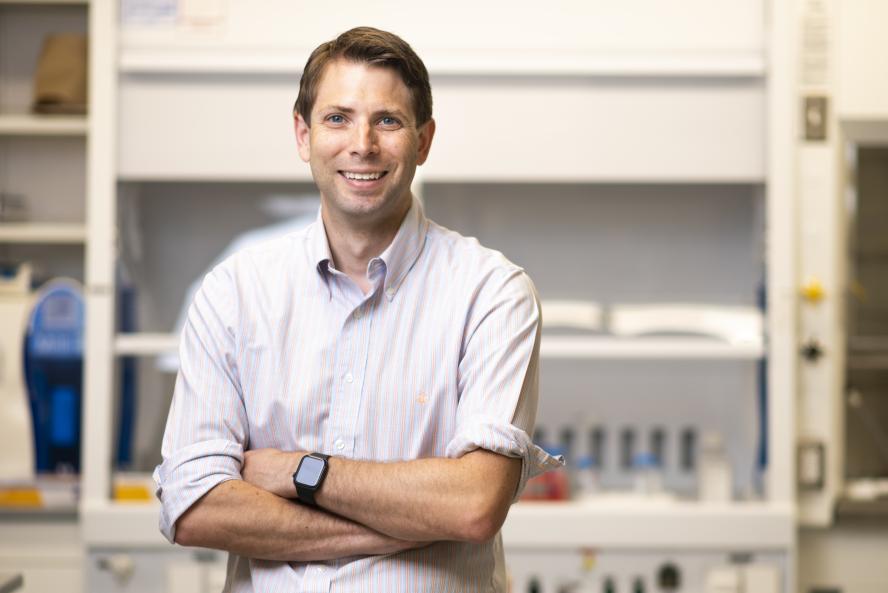Timko receives NSF CAREER Award

Assistant Professor Brian Timko of the Tufts University Department of Biomedical Engineering has received a CAREER Award from the U.S. National Science Foundation (NSF). The NSF’s Faculty Early Career Development (CAREER) Program supports outstanding early-career faculty with the potential to lead advances in research and serve as academic role models.
In vitro brain tissue models are crucial to the study of the brain, enabling research studies that can’t be performed in living humans. These models can be designed with complex neuronal networks that mimic the hierarchal structure of the human brain. Despite their potential as scientific tools, a key limitation is that researchers can’t directly interact with the electrical impulses transmitted throughout these neuronal networks.
Through the research proposal funded by the NSF, Timko will explore lab-grown brain tissues monitored and controlled through embedded bioelectronic devices. He seeks to develop a brain-machine interface – an engineered hybrid brain tissue model which, in three-dimensional configurations, will merge functional neuronal networks with bioelectronic devices. This model will provide bioelectronic readouts of neuronal function throughout the tissue as well as localized stimulation capabilities that mimic sensory inputs. “The central hypothesis is that information stored and transmitted in neuronal networks can be decoded or reprogrammed via this two-way bioelectronic interface,” says Timko.
This work could provide insights into how sensory signals are processed, how the brain reacts to stimuli, and how information is stored. It could also enable powerful models for brain dysfunction, including neurological disorders such as Alzheimer’s disease. The research could also lead to new bioelectronic paradigms that could be transformational to fields like bioelectronic and regenerative medicine, developmental biology, and hybrid biological/solid-state computation.
The NSF CAREER Award funding will also support the use of neuroscience as a tool to recruit and retain students from groups historically underrepresented in STEM fields. A group of Tufts collaborators that includes Timko, the Tufts Center for STEM Diversity, and the Tufts Center for Engineering Education and Outreach will offer funded summer internships, high school outreach, and neuroscience coursework developed to engage a diverse audience.
At Tufts School of Engineering, Timko leads a research team that focuses on studying the interface between living systems and synthetic electronics. His team developing new polymers and nanomaterials, including nanoelectronic devices, with the goal of achieving stable, long-term communication with engineered tissues. In addition to the brain, these technologies could also play a key role in the heart, where electrical activity also plays a crucial role. Recently Timko also received an American Heart Association (AHA) Transformational Project Award, which supports high-impact, innovative projects that could lead to major advancements in the field of cardiovascular and/or cerebrovascular research. Given the importance of electrical signaling in all aspects of physiology, the work generated by these NSF and AHA awards could lead to important new advances in fundamental science, regenerative medicine and bioelectronic therapies.
Learn more about Timko’s research.
The content of this article is solely the responsibility of the authors and does not necessarily represent the official views of the National Science Foundation or American Heart Association. Research reported in this article was supported by the National Science Foundation, under award number 2239557, and the American Heart Association, under award number 23TPA1057212.
Department:
Biomedical Engineering